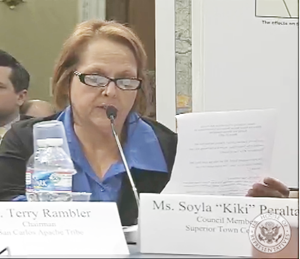
By Phil Riske, managing editor, Rose Law Group Reporter
WASHINGTON – All politics is local, and a heated discussion about the Superior City Council’s opposition to a federal land exchange bill wrapped up a congressional hearing Thursday into HR 687. The town, with a long history of copper mining, reversed its previous support of the bill, which is required for Resolution Copper to construct what would be the largest copper mine in North America.

As he did with most of the witnesses against the bill, Rep. Paul Gosar, who with Rep. Ann Kirkpatrick sponsors the bill, took on Superior Town Councilwoman Soyla “Kiki” Peralta in a manner similar to a lawyer in a courtroom. He noted the council did not take public comments in the meeting, during which opposition to the mine was adopted, despite the 200 people who wanted to testify.
“Is that fair?” Ms. Peralta, Gosar asked.
Superior’s opposition was the only fresh issue as the hearing before the Committee on Natural Resources: Subcommittee on Energy and Mineral Resources was the fifth such hearing on the bill. The House last session approved the land swap, but the bill died in the Senate, where Sen. Jeff Flake has reintroduced it.
Peralta said the town council opposed the bill because there are no environmental studies concerning the mine’s impact on water and other environmental concerns.
“Water is more valuable than copper,” she said.
Gosar noted Superior news media and most town folks decried the council’s decision and he put 400 letters from Superior residents in favor of the mine into the hearing record.
The mine has been projected to create 3,000 direct and indirect jobs over a six-year construction period and would produce $61B over its lifetime and $19B of federal and county tax revenues.
“Last I checked, you could use a few billion,” said Steve Miller, chairman of the Pinal County Board of Supervisors.
During his testimony, Miller noted the unanimous support for the mine by the supervisors and called for immediate passage.

Under questioning from Gosar, Miller said he didn’t know why Superior reversed its support.
Developers have been trying to win congressional approval of the project for nearly eight years, and the continued uncertainty over the mine’s future prompted Resolution Copper Mining Co. to lay off more than 200 of its 540 workers since November. The number of employees will drop to 140 by year’s end if the project is not approved, developers told the news media.
Touting the jobs potential, Gosar noted and Peralta acknowledged Superior is broke.
Also, Peralta, who is the subject of a recall petition, accused Gosar of being inaccessible to Superior officials and residents, which was denied.
“You are one of the most accessible” officials, Pinal’s Miller said.
Resolution Copper has spent nearly $1 billion on the project, but it needs congressional approval for a land swap to fully develop the mine. The swap would give the mine about 2,400 acres in the Oak Flat area of the Tonto National Forest. The company would deed more than 5,000 acres of environmentally sensitive land throughout Arizona to the federal government.
Testifying against the bill were representatives of the Interior Dept., Dept. of Agriculture, U.S. Forest Service, Bureau of Land Management, Earthworks and San Carlos Apache Tribe Chairman Terry Rambler. Most expressed concerns about environmental impacts.
Rambler said the tribe opposes the mine because it would destroy sacred land, specifically the Oak Creek Flat area, where “our people dance and pray.” He said the mine would deplete enough surface water to serve 180,000 people and would “be a bad deal for American taxpayers.”
Miller said Resolution Copper has spent a lot of money on environmental protections, and Gosar added that before the mine is approved, it would under go several environmental studies.
Throughout the hearing, Gosar repeated “The facts will set you free.”
Ranking member Rep. Raul Grijalva, who called the bill a “deception,” called for a delay in processing the bill until federal officials meet with tribal officials, and until there are assurances from the State Department the mine would not violate sanctions against Iran. He disputed the jobs figures, saying they come only from Resolution Copper.
If approved, the 7,000 feet deep mine would produce more than one-fourth the amount of copper produced in the United States today by all other mines combined. It would be the largest annual copper-producing project in the nation.
Today’s hearing went more than four hours because testimony on other minerals bills was interspersed in comments on the Arizona bill.
Watch the video if the hearing here: http://naturalresources.house.gov/calendar/eventsingle.aspx?EventID=323498







